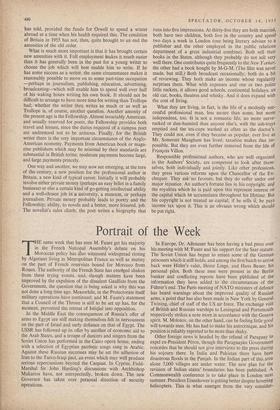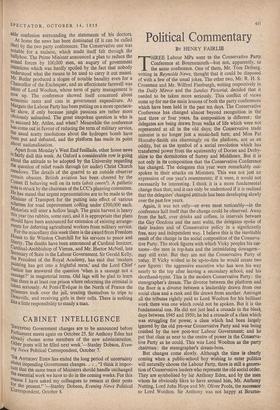Portrait of the Week
T, HE same week that has seen M. Faure get his majority in the French Natiopal Assembly's debate on his' Moroccan policy has also witnessed widespread rioting by Algerians living in Metropolitan France as well as mutiny on the part of French reservists bound for Morocco from Rouen. The authority of the French State has emekged shaken from these trying events, and, though matters have been improved by the expulsion of the dissident Gaullists from the Government, the question that is being asked is why this was not done a long time ago. Meanwhile, in the Protectorate itself military operations have continued; and M. Faure's statement that a Council of the Throne is still to be set up has, for the moment, prevented the retreat of Istiqlal into opposition.
In the Middle East the consequences of Russia's offer of arms to Egypt are still making themselves felt in nervousness on the part of Israel and surly defiance on that of Egypt. The USSR has followed up its offer by another of economic aid to the Arab States, and a troupe of dancers and singers from the Soviet Union has performed in the Cairo opera house, ending with a selection of Egyptian patriotic. songs sung in Arabic. Against these Russian successes niay be set the adhesion of Iran to the Turco-lraqi pact, an event which may well produce serious repercussions beyond the Caspian. In Cyprus, Field- Marshal Sir John Harding's discussions with Archbishop Makarios have, not unexpectedly, broken down. The new Governor has taken over personal direction of security operations. In Europe, Dr. Afienauer has been having a bad press over his.meeting with M. 'Faure and his support for the Saar statute. The Soviet Union has begun to return some of the German prisoners which it still holds, and among the first batch to arrive back were Hitler's valet, Heinz Linge, and Hans Bauer, his personal pilot. Both these men were present in the Berlin bunker and conflicting reports have been published of the information they have added to the circumstances of the Fiihrer's end. The Paris meeting of NATO ministers of defence has heard warnings about the improved quality of Russian arms, a point that has also been made in New York by General Twining, chief of staff of the US air force. The exchange visit of British and Russian warships to Leningrad and Portsmouth respectively strikes a note more in accordance with the Geneva spirit. M. Molotov, on the other hand, can be feeling little-good will towards men. He has had to make his autocritique, and his position is reliably reported to be more than shaky.
Other foreign news is headed by the 'refusal of Paraguay to expel ex-President Peron, though the Paraguay/an Government concedes that he should not give interviews to the press during his sojourn there. In India and Pakistan there have been disastrous floods in the Punjab. In the Indian part of this,area alone 7,000 villages are under water. The new plan for the revision of Indian states' boundaries has been published. A Commonwealth conference is to take place in London next summer. President Eisenhower is getting better despite hovering helicopters. This is what emerges from the very consider- able confusion surrounding the statements of his doctors. At home the news has been dominated (if it can be called that) by the two party conferences. The Conservative one was notable for a malaise, which made itself felt through the ballyhoo. The Prime Minister announced a plan to reduce the armed forces by 100,000 men, an augury of government intentions which was hardly spoiled by the fact that nobody understood what the means to be used to carry it out meant. Mr. Butler produced a slogan of notable banality even for a Chancellor of the Exchequer, and an affectionate farewell was taken of Lord Woolton, whose term of party management is noW up. The conference showed itself concerned about economic rents and cuts in government expenditure. At Margate the Labour Party has been putting on a more spectacu- lar show, if only because jungle passions are rather more obviously unleashed. The great unspoken question is who is to succeed Mr. Attlee, and when? Meanwhile the conference has come out in favour of reducing the term of military service, the usual scatty resolutions about the hydrogen bomb have been put and defeated, and the platform has made its point about nationalisation.
Apart from Monday's West End fusillade, other home news Is fairly dull this week. At Oxford a considerable row is going about the attitude to be adopted by the University regarding the question of relief roads through (or under) Christ Church Meadows. The details of the quarrel to an outside observer remain obscure. British aviation has been cheered by the Comet II behaving well on its tests (absit omen!). A pathetic note is struck by the chairman of the LCC's planning committee. He has stated that urgent representations are to be made to the Minister of Transport for the putting into effect of various schemes for road improvement costing under £500,000 each. Motorists will utter a hollow laugh. The grain harvest is heavy this year (no rabbits, some sun), and it is appropriate that plans should have been announced for extension of existing arrange- ments for deferring agricultural workers from military service. For the miscellany this week there is the award from Freedom House to Sir Winston Churchill for his services to peace and liberty. The deaths have been announced of Cardinal Innitzer, Cardinal-Archbishop of Vienna, and Mr. Hector McNeil, late Secretary of State in the Labour Government. Sir Gerald Kelly, the President of the Royal Academy, has said that 'modern painting has got into a frightful mess,' and the Lord Chief Justice has answered the question 'when is a sausage not a sausage?' in magisterial terms. Old lags will be glad to learn that there is at least one prison where reforming the criminal is taken seriously. At Pont-l'Eveque in the North of France the prisoners took over the jail, treating themselves to trips to _Deauville, and receiving girls in their cells. There is nothing like a little responsibility to steady a man.











































 Previous page
Previous page